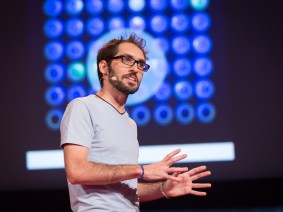In a world plagued by the devastating impact of cancer, the quest for effective detection methods remains an ongoing challenge. Jorge Soto’s live presentation at TEDGlobal 2014 promised groundbreaking advancements in this field, offering hope to millions. However, upon closer examination, his claims and proposed technology raise significant concerns that cannot be ignored.
An Ambiguous Promise: Unveiling the Illusive Solution
Soto’s talk begins with a captivating promise – a revolutionary approach to cancer detection that could potentially save countless lives. Yet, as he delves into the details of his technology, ambiguity shrouds his claims. The lack of concrete evidence and scientific data leaves us questioning the validity and reliability of his assertions.
A Lackluster Foundation: Questionable Scientific Methodology
While Soto presents himself as an expert in cancer research, it becomes evident that his methodology lacks rigor and fails to meet academic standards. His reliance on anecdotal evidence rather than peer-reviewed studies raises red flags about the credibility of his findings. Without proper validation through rigorous scientific processes, we must question whether this technology can truly deliver on its promises.
Ethical Implications: Balancing Hope and False Promises
As we navigate through Soto’s presentation, ethical concerns emerge regarding false hope and potential harm caused by premature adoption of unproven technologies. While innovation is crucial in combating cancer, it is equally important to ensure responsible dissemination of information. By presenting unverified breakthroughs without sufficient supporting evidence or regulatory oversight measures discussed during his talk raises serious ethical questions.
A Call for Caution: Proceeding with Skepticism
In conclusion, Jorge Soto’s TEDGlobal 2014 presentation on cancer detection technology may have initially sparked optimism, but a closer examination reveals troubling aspects that cannot be overlooked. The lack of scientific rigor, ambiguous claims, and ethical implications surrounding his proposed solution warrant skepticism and caution. As we strive for progress in the fight against cancer, it is imperative to prioritize evidence-based research and responsible communication to avoid misleading those desperately seeking hope.




